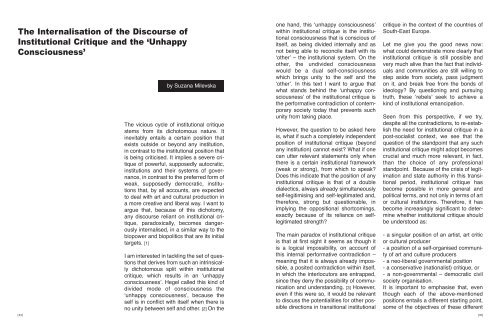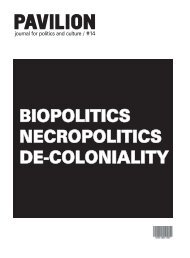Download pdf version of issue no. 16 (4 Mb) - Pavilion
Download pdf version of issue no. 16 (4 Mb) - Pavilion
Download pdf version of issue no. 16 (4 Mb) - Pavilion
You also want an ePaper? Increase the reach of your titles
YUMPU automatically turns print PDFs into web optimized ePapers that Google loves.
The Internalisation <strong>of</strong> the Discourse <strong>of</strong><br />
Institutional Critique and the ‘Unhappy<br />
Consciousness’<br />
[34]<br />
by Suzana Milevska<br />
The vicious cycle <strong>of</strong> institutional critique<br />
stems from its dichotomous nature. It<br />
inevitably entails a certain position that<br />
exists outside or beyond any institution,<br />
in contrast to the institutional position that<br />
is being criticised. It implies a severe critique<br />
<strong>of</strong> powerful, supposedly autocratic,<br />
institutions and their systems <strong>of</strong> governance,<br />
in contrast to the preferred form <strong>of</strong><br />
weak, supposedly democratic, institutions<br />
that, by all accounts, are expected<br />
to deal with art and cultural production in<br />
a more creative and liberal way. I want to<br />
argue that, because <strong>of</strong> this dichotomy,<br />
any discourse reliant on institutional critique,<br />
paradoxically, becomes dangerously<br />
internalised, in a similar way to the<br />
biopower and biopolitics that are its initial<br />
targets. [1]<br />
I am interested in tackling the set <strong>of</strong> questions<br />
that derives from such an intrinsically<br />
dichotomous split within institutional<br />
critique, which results in an ‘unhappy<br />
consciousness’. Hegel called this kind <strong>of</strong><br />
divided mode <strong>of</strong> consciousness the<br />
‘unhappy consciousness’, because the<br />
self is in conflict with itself when there is<br />
<strong>no</strong> unity between self and other. [2] On the<br />
one hand, this ‘unhappy consciousness’<br />
within institutional critique is the institutional<br />
consciousness that is conscious <strong>of</strong><br />
itself, as being divided internally and as<br />
<strong>no</strong>t being able to reconcile itself with its<br />
‘other’ – the institutional system. On the<br />
other, the undivided consciousness<br />
would be a dual self-consciousness<br />
which brings unity to the self and the<br />
‘other’. In this text I want to argue that<br />
what stands behind the ‘unhappy consciousness’<br />
<strong>of</strong> the institutional critique is<br />
the performative contradiction <strong>of</strong> contemporary<br />
society today that prevents such<br />
unity from taking place.<br />
However, the question to be asked here<br />
is, what if such a completely independent<br />
position <strong>of</strong> institutional critique (beyond<br />
any institution) can<strong>no</strong>t exist? What if one<br />
can utter relevant statements only when<br />
there is a certain institutional framework<br />
(weak or strong), from which to speak?<br />
Does this indicate that the position <strong>of</strong> any<br />
institutional critique is that <strong>of</strong> a double<br />
dialectics, always already simultaneously<br />
self-legitimising and self-legitimated and,<br />
therefore, strong but questionable, in<br />
implying the oppositional shortcomings,<br />
exactly because <strong>of</strong> its reliance on selflegitimated<br />
strength?<br />
The main paradox <strong>of</strong> institutional critique<br />
is that at first sight it seems as though it<br />
is a logical impossibility, on account <strong>of</strong><br />
this internal performative contradiction –<br />
meaning that it is always already impossible,<br />
a posited contradiction within itself,<br />
in which the interlocutors are entrapped,<br />
since they deny the possibility <strong>of</strong> communication<br />
and understanding. [3] However,<br />
even if this were so, it would be relevant<br />
to discuss the potentialities for other possible<br />
directions in transitional institutional<br />
critique in the context <strong>of</strong> the countries <strong>of</strong><br />
South-East Europe.<br />
Let me give you the good news <strong>no</strong>w:<br />
what could demonstrate more clearly that<br />
institutional critique is still possible and<br />
very much alive than the fact that individuals<br />
and communities are still willing to<br />
step aside from society, pass judgment<br />
on it, and break free from the bonds <strong>of</strong><br />
ideology? By questioning and pursuing<br />
truth, these ‘rebels’ seek to achieve a<br />
kind <strong>of</strong> institutional emancipation.<br />
Seen from this perspective, if we try,<br />
despite all the contradictions, to re-establish<br />
the need for institutional critique in a<br />
post-socialist context, we see that the<br />
question <strong>of</strong> the standpoint that any such<br />
institutional critique might adopt becomes<br />
crucial and much more relevant, in fact,<br />
than the choice <strong>of</strong> any pr<strong>of</strong>essional<br />
standpoint. Because <strong>of</strong> the crisis <strong>of</strong> legitimation<br />
and state authority in this transitional<br />
period, institutional critique has<br />
become possible in more general and<br />
political terms, and <strong>no</strong>t only in terms <strong>of</strong> art<br />
or cultural institutions. Therefore, it has<br />
become increasingly significant to determine<br />
whether institutional critique should<br />
be understood as:<br />
- a singular position <strong>of</strong> an artist, art critic<br />
or cultural producer<br />
- a position <strong>of</strong> a self-organised community<br />
<strong>of</strong> art and culture producers<br />
- a neo-liberal governmental position<br />
- a conservative (nationalist) critique, or<br />
- a <strong>no</strong>n-governmental – democratic civil<br />
society organisation.<br />
It is important to emphasise that, even<br />
though each <strong>of</strong> the above-mentioned<br />
positions entails a different starting point,<br />
some <strong>of</strong> the objectives <strong>of</strong> these different<br />
[35]








